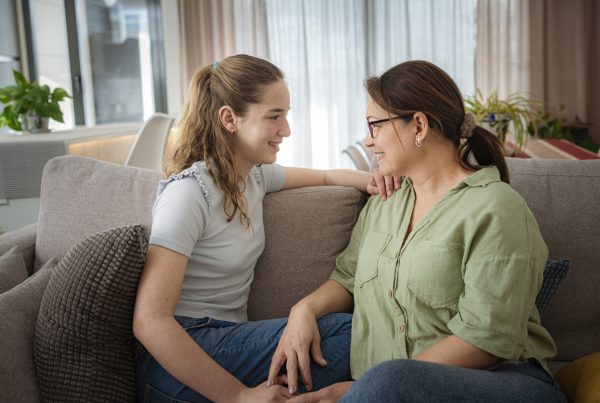In addition to our therapeutic programs, Visions offers contemplative practices to our  teens that teach and encourage skills for self-regulation and self-care. We have regular yoga classes and a weekly meditation group.
teens that teach and encourage skills for self-regulation and self-care. We have regular yoga classes and a weekly meditation group.
Jessica Rosen, founder of One Down Dog in Silverlake, heads up our yoga program. She brings in a playful element to yoga that the kids love. This allows them to reconnect with themselves in a profound way. I spoke to Jessica and asked her what she feels she brings to the clients, and how contemplative practices are helpful in recovery. She said, “Through the practice of yoga I hope to offer students the tools to get comfortable in discomfort. Through yoga and meditation we explore our challenges, we confront our inner critic, we gain clarity and find acceptance. For example, the ability to sit in a hip opener may help us sit through a tough breakup, or better handle confrontation and fights with our friends/parents, and gain confidence in ourselves and our appearance.”
I also asked Joseph Rogers, Visions Education Coordinator at the Visions Day School, Chaplain and meditation facilitator, how he feels meditation is helping the clients. Joseph said, “The most immediate and greatest benefit is that the clients learn how to, as the Big Book says, ‘stop and pause when agitated.’ Additionally, I try to make a great deal of effort to put these kids on the path of compassion for themselves and others.”
The contemplative practices can have a profound effect on one’s ability to self-regulate, self-soothe, and connect with the present moment. Both offer a chance to pause, to look inward, and to come to a place of equanimity (mental calmness and composure) when faced with difficulty.
I too teach yoga to youth, and one thing I notice are the high levels of stress these kids face. The pressures of being cool, getting good grades, and the discomfort of the rapid physical changes can be overwhelming. This is where contemplative practices are useful. I’ve found that teaching kids the ability to take a deep breath and pause before responding or reacting to difficulty is hugely beneficial. Developing a sense of self-awareness helps eliminate the sense of perpetual urgency to respond or act on an impulse. The contemplative practices also engage the parasympathetic nervous system—the area within our nervous system that quiets the fight or flight response, quells anxiety, and brings things back into harmony.
There are three key tools for self-regulation, and the contemplative practices are the perfect conduit for them:
Grounding, Resourcing, and Orienting.
Grounding: Reconnecting to the present moment, your emotions and physical sensations. One grounds themselves by noticing their feet on the floor, or placing your hands on something solid in order to help themselves get back into the body. Taking deep breaths while you are doing this can help you track the sensations mindfully. Taking a time out when you are dysregulated is the first step to getting grounded.
Resourcing: We all have resources within us or outside of ourselves. Resources are tools we can easily access that make us reconnect with calm. For example, breath can be a resource. Your hands on your belly or lap can be a resource. Your pet can be a resource. A resource is something that helps you feel good when everything around you is dismal.
Orienting: Checking in with your surroundings. When we are not self-regulated, we check out. This is a disembodying experience–one that feels determinedly unsafe and out of control. So when we orient, we do so by consciously noticing our surroundings and we do this by looking around the room, noticing where we are, where we are sitting or standing—Orienting is acute observation or present-time awareness.
The contemplatice practices of yoga and meditation provide a means of engaging the parasympathetic nervous system. They create a sense of awareness, and allow the practitioner to be ok with not being ok, and to accept where they are emotionally and physically in that particular moment in space and time. Addiction and mental illness are dysregulating, but the use of contemplative practices opens the door to self-regulation, which does foster recovery.







